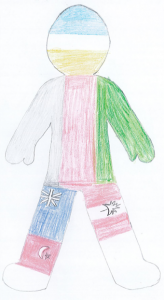
Stories are powerful. They shape the way we think about the world, ourselves and each other. The stories we choose to present to students at school, as teachers and librarians, profoundly affect how students perceive the world and their place in it. We want to help you choose culturally diverse resources that reflect students’ diverse lives, promote inclusion, challenge stereotypes, confront racism and ultimately strengthen our multicultural society.
This series of professional learning events is a result of collaboration between staff from the Languages and Multicultural Education Resource Centre (LMERC), the School Libraries Association of Victoria (SLAV), Stella Schools, and VicTESOL.
About the Organisers:
The School Library Association of Victoria (SLAV) offers dynamic and inspiring opportunities for teacher-librarians and library teams to build their essential role in engaging and developing lifelong learners. Through leadership, advocacy and collegiality and an extensive professional learning and publications program.
www.slav.org.au
Stella is an organisation that champions cultural change through recognising, elevating and celebrating Australian women’s writing. It includes the annual Stella Prize award for women’s writing, the Stella Count, which examines gender bias in book reviewing and Stella Schools, which develops programs that seek to inspire and empower young people to find their own creative voices, challenge stereotypes and imagine a future not limited by their gender.
https://thestellaprize.com.au/
The Languages & Multicultural Education Resource Centre (LMERC) is for educators across all sectors K-12. LMERC provides resources in the areas of English as an Additional Language (EAL), Languages other than English, the Intercultural Capability and the cross curriculum priorities areas of Aboriginal and Torres Strait Islander histories and cultures, Asia and Australia’s engagement with Asia, and Sustainability. The library holds an extensive collection of over 25,000 resources in all formats for educators across all sectors and at all levels, early childhood to adult. Library membership is available free to teachers from these educational settings: early childhood centres (in receipt of government funding), schools F-12 across all sectors, pre-service teachers and lecturers (in the areas of EAL and languages), homework clubs and community language schools. Home school parents, teachers of adults and community workers in education roles are also welcome to join.
https://lmerc.softlinkhosting.com.au/oliver/home/news
Download (PDF, 407KB)
Download (PDF, 172KB)
Finding culturally diverse literature:
Stella has a couple of wonderful resources to support your text selection around gender diversity and writing from the intersection. If you would like to know more you can contact Lenny Robinson: schools [at] thestellaprize.com.au and visit https://thestellaprize.com.au/.
In Part 3 of this Professional Learning Series (7 October 2020), groups discussed:
Auditing and Selection:
- Have you audited your collections or text list?
- What is your current process for selecting texts for the library or classroom study?
- Do you have a selection policy? Is it ratified by the school administration?
- What is included in text selection criteria?
- What is the text selection process? How do you ensure input from all stakeholders?
- How do you get input from students?
- Have you set targets for the text list? What factors impedes reaching targets?
- What changes are you considering making to your text selection process to improve it?
- How do you make sure the texts you select are accessible to EAL learners at your school/institution?
Wider reading:
- Beyond set texts, how do you promote diverse literature for pleasure reading?
- Wider reading programs allow access to a wide range of resources. In what other ways can we support students to access culturally diverse literature?
- What strategies do you have for engaging EAL learners in wider reading?
Suggestions:
- What suggestions do you have for culturally diverse literature?
- What suggestions do you have for finding quality, diverse literature? (eg. Suppliers, websites etc)
- Multilingual resources – Suggestions?
- What changes are you considering making to the texts in your collection or text lists?
In Part 2 of this Professional Learning Series (15 September 2020)
In part 2, we discussed possible ways to audit your current text lists or collections, and give resource recommendations for you to consider introducing at your school or institution.
Jennifer Peck took participants through the resources available through LMERC, including lists of culturally diverse texts.
Stella Schools Manager Lenny Robinson introduced the audience to two resources developed by Stella Schools to support diversity in text selection: The Read Up Reading Guide, developed in partnership with the Victorian Government, and the Stella Sparks Reading Guide, one of several resources included in their Resource Kit for Stella Sparks schools program.
We then split into groups facilitated by SLAV and LMERC librarians who took participants through some resource recommendations. This part of the session was not recorded.
Jennifer Peck’s presentation:
Download (PDF, 5.18MB)
Lenny Robinson- Stella Schools Manager:
LMERC text lists:
Group Presentation Resources:
- 6-12 year old readers– Raff Grasso:
https://bit.ly/2RrMd6y
https://padlet.com/grassr/2qvzrijrajxkn8nm
Participants were asked to read the article ‘Assessing and selecting culturally diverse literature for the classroom’ by Helen Adam and Laurie Harper (2016) prior to attending this professional learning event. The article can be accessed by clicking here.
Adam, H., & Harper, L. (2016). Assessing and selecting culturally diverse literature for the classroom. Retrieve from https://ro.ecu.edu.au/ecuworkspost2013/1892



